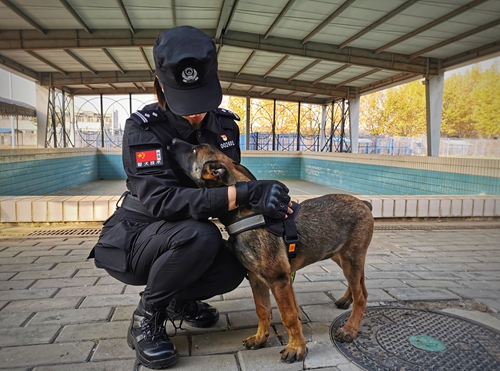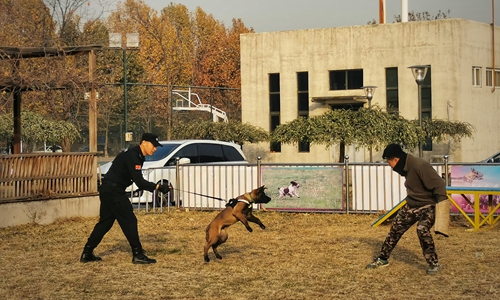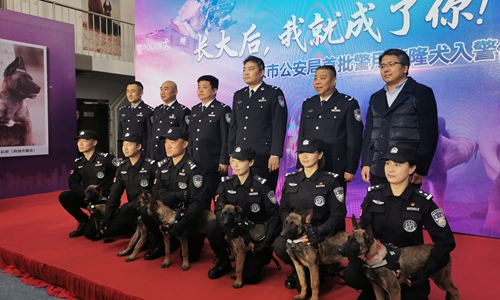
Liu Shasha, a K-9 trainer with a cloned dog in Beijing. (Photo: Global Times)
Beijing's first cloned K-9 unit, consisting of six 3-month old dogs, began training at a police facility on Wednesday, making the city's Public Security Bureau (PSB) home to the largest cloned K-9 unit in China.
Four members of the cloned K-9 unit were born during a single birth, marking another world's first, said PSB officer and veterinarian Ma Jinlei with the dog technical detachment division, to the Global Times.

A cloned K-9 during a training session in Beijing. (Photo: Global Times)
Five of the K-9 clone were from Sijiding, a five-year-old male sniffer Belgian Malinois, and a member of the Beijing police. And one clone from A'rui, a four-year-old K-9 male, trained at biting and attacking, and the same breed as Sijiding, according to Ma.
Sijiding was recognized by the Ministry of Public Security as a meritorious dog, for contributions made from sniffing out explosive devices and materials.
The K-9 pups were born in early August at an experimental lab with the Beijing-based Sinogene Biotechnology Company, and with the support of the Ministry of Public Security, Ma noted.
A study revealed the cloned K-9 DNA was over 99 percent similar to their donors.
Somatic cells preserve quality breeding and make volume reproduction possible, said police officer Wang Lei, to the Global Times on Wednesday.
The birth of the six K-9s marked a breakthrough in animal clone technology and will significantly reduce the amount of time it takes to train dogs, Wang said.
According to a report from Science and Technology Daily, it would take four to five years to train dogs like Sijiding and A'rui and cost 400,000 ($59,560) to 500,000 yuan.
After conducting a series of tests, Liu Shasha, a dog trainer at the Beijing Dog Base of Public Security, said the cloned dogs show better potential than normal-bred police dogs.
The abilities of the cloned K-9s are already similar to a six-month-old normal-bred police dog, Liu noted.
Ma said preserving K-9 blood has always been a challenge for breeders, as traditional methods diluted the original, making the subsequent generation's genes hard to manipulate.
The advanced K-9 clone technology would address those problems and lower fail-rates at the puppy stage, Ma explained.
Ma also noted they will continue to work with biotechnology companies on cloning K-9 litters and establish a somatic cell bank to preserve and breed high-quality dogs.

Six cloned K-9s begin training at a police facility in Beijing. (Photo: Global Times)


